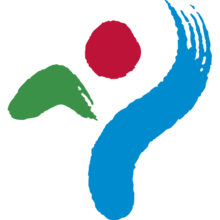Seoul Metropolitan Government
| Seoul Metropolitan Government | |
 |
|
| Korean name | |
|---|---|
| Hangul | 서울특별시청 |
| Hanja | 서울特別市廳 |
| Revised Romanization | Seoul teukbyeolsi cheong |
| McCune–Reischauer | Sŏul tŭkbyŏlsi ch'ŏng |
Seoul Metropolitan Government is a local government of Seoul, South Korea. The mayor is elected to a four-year term by the Seoul citizens and is responsible for the administration of the city government. Seoul Metropolitan Government deals with administrative affairs as the capital city of South Korea, so it is more centralized than that of most other cities with the city government being responsible for public education, correctional institutions, libraries, public safety, recreational facilities, sanitation, water supply, and welfare services.
In the city government, there are 5 offices, 32 bureaus, and 107 divisions. The headquarters is located in the Seoul City Hall building which is in Taepyeongno, Jung-gu, Seoul. The Government started on September 28, 1946 as the Seoul City Government which became Seoul Metropolitan Government on August 15, 1949. The Seoul Metropolitan Government has one mayor and three vice mayors, two of them take charge of administrative affairs and the other for political affairs. Seoul is subdivided into 25 autonomous gu and 522 administrative dong.
The Seoul Institute (SI) is the think tank for the city, established in 1992 by the Seoul Metropolitan Government. It was formerly known as The Seoul Development Institute (SDI). The SI supports the policy-making processes of the municipal administration by conducting intensive research and cooperating with domestic and foreign research institutes. The SI seeks to collaborate and communicate with the citizens of Seoul "to secure the validity of its various policy researches".
In 2011, when Government 2.0 was still a new concept to many, the fifth elected mayor of the City of Seoul, Mr. Wonsoon Park, introduced many policies to promote democracy based on civil participation after his inauguration. As one of his key agenda, he suggested the Governance 2.0, based on the concepts of ‘Communication, Cooperation, and Participation,’ as he established the foundation for promoting citizen participation in the governance of the city and sought to provide all administrative information of the city through the Information Communication Plaza.
The City of Seoul discloses all of its administrative information except for that information designated as classified in accordance with the law. Through this policy, the city upholds the rights to information of the citizens, enhances transparency in the administration, and promotes accountability. Also, through the Information Communication Plaza of the city, the metropolitan government gathers up and returns various administrative information to its citizens.
...
Wikipedia
